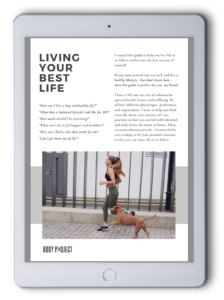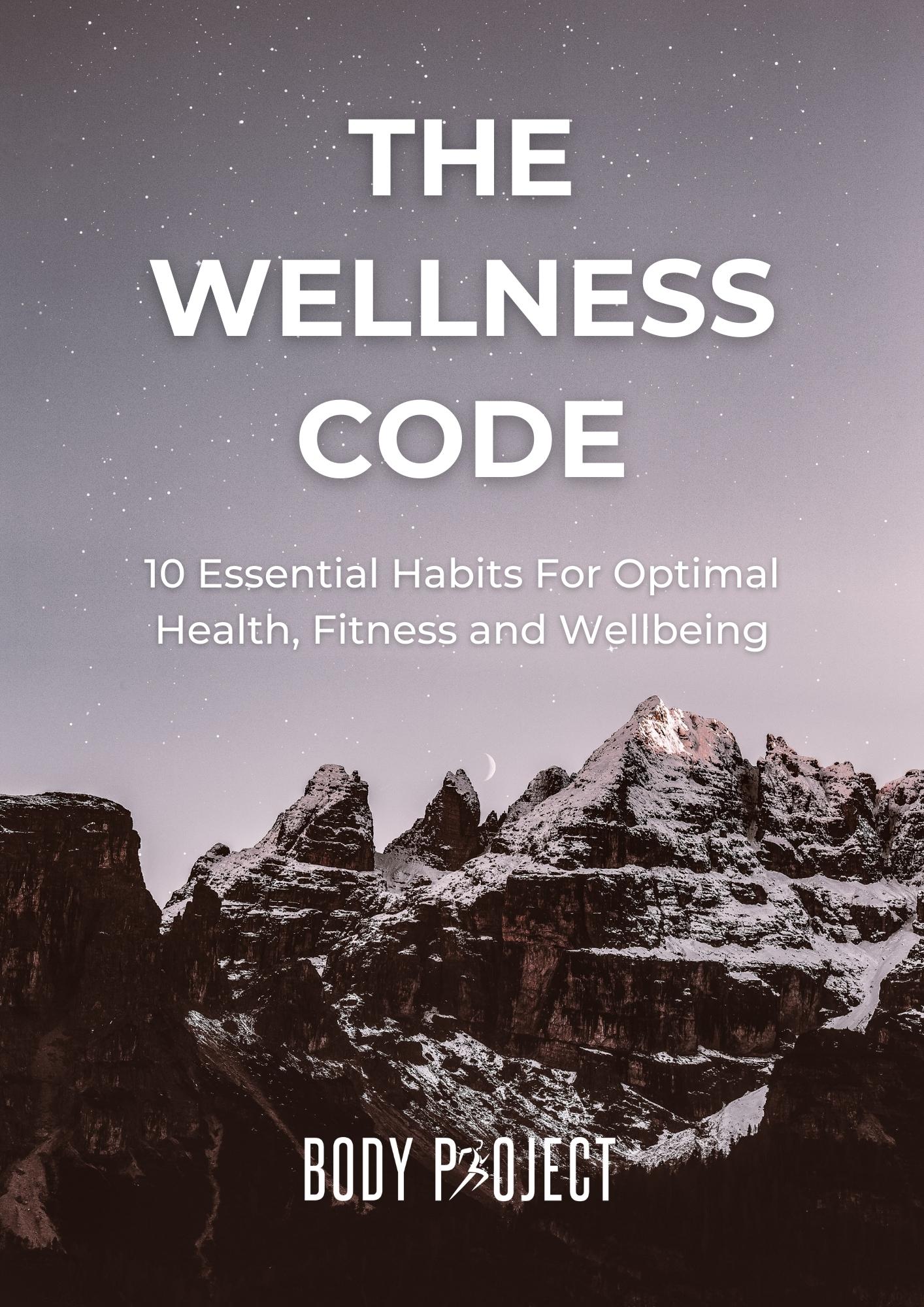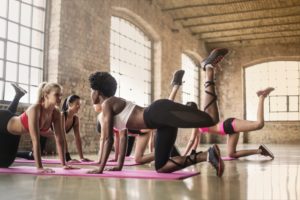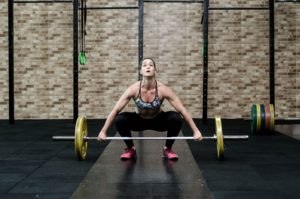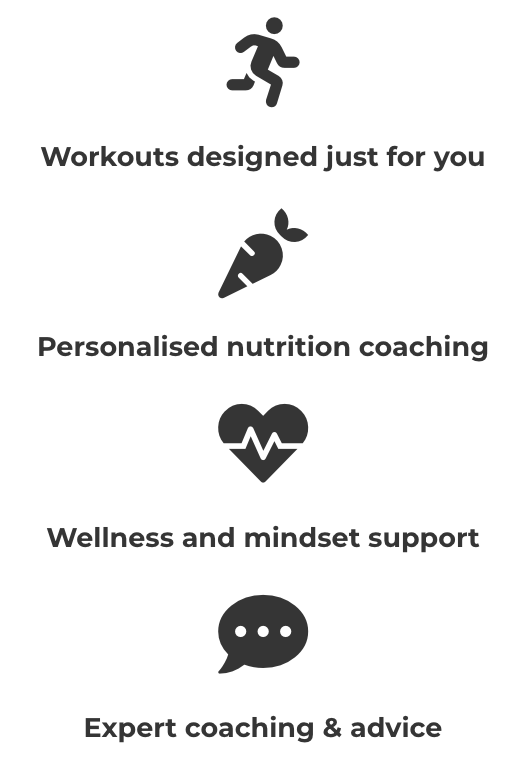Why Is Post-Workout Recovery So Important?
You already know that exercising makes you fitter, faster, stronger, more flexible, and more muscular, but you might be surprised to learn how that process works.
During training, we cause stress and microscopic damage on a cellular level in our bodies, fatiguing us and actually decreasing our performance for a short period. This stress and damage acts as a catalyst for change, forcing us to adapt. As we recover, we improve, which means we’re able to perform at a higher level next time we work out.
This means gains are made during recovery, not training.
In this article you’ll learn:
- Why recovery is as important as the workout itself
- How long it should take to recover from a workout
- Why beginners make such fast improvements, known as “beginner gains”
- How you can ride the recovery wave to get more from your training
- The dangers of overtraining & signs to look for
- 9 ways to recover faster
NB: If you love geeking out on training science then check out the graphs below. If you just want to skip straight to the recovery tips, click here.
How Long Should It Take To Recover From A Workout?
Recovery rates depend heavily on your training experience, as you can see in the table below.
Beginner Athletes
9 months or less consistent training experience*
Require roughly 24-72 hours to recover from a workout.
* even if you've achieved a good level of training in the past, if you're starting up again after a long break you should consider yourself a beginner.
Intermediate Athletes
9 months to 4 years consistent training experience**
Require roughly 1 week to recover from a workout.
** most exercisers training for health and wellbeing will remain in this category for life - and that's a good thing!
Advanced Athletes
2 or more years consistent training experience***
Require 1 month or more to recover from a workout.
*** some gifted individuals will be able to reach advanced level with a lot of hard work in as little as 2 years. This is uncommon.
What Are "Beginner Gains"?
The popular term “beginner gains” refers to the fast improvements made by people who are relatively new to exercise, or returning to training after a long time. But why do beginners make such fast gains?
This graph shows the difference between beginner, intermediate, and advanced athletes. You’ll see that beginners, who are very far from their genetic performance potential, adapt and improve quickly, and don’t need particularly complex exercise programming. Beginners lack the strength and neuromuscular efficiency to be able to push themselves enough to create a lot of training stress, which means they don’t need long to recover from exercise. A beginner could do a heavy squats session on Monday, and adapt so quickly that they’d be able to productively train squats again on Wednesday.
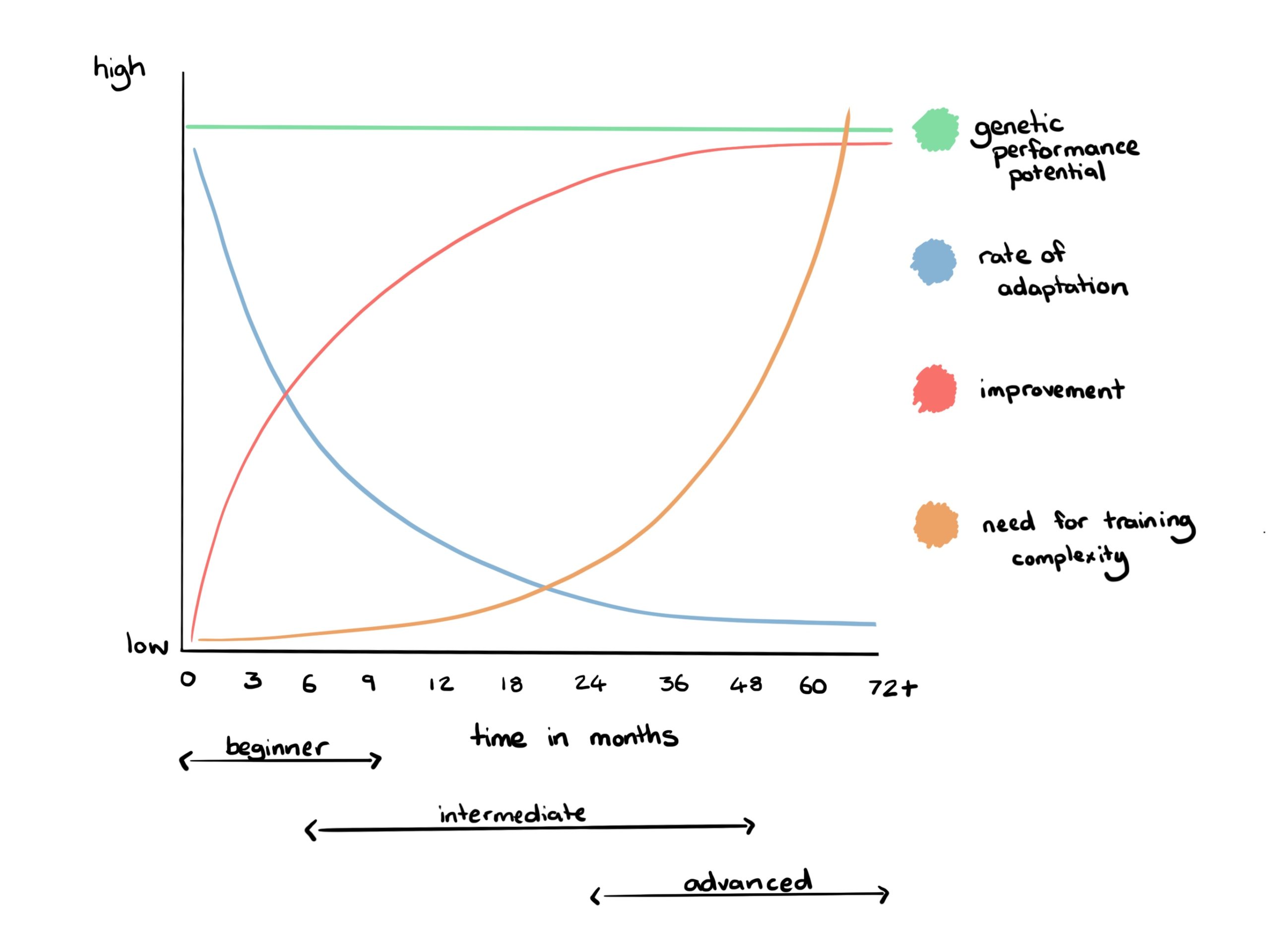
For advanced athletes working close to their genetic potential, such high training intensity is required that they need a lot of rest and recovery from the training stress: they adapt slowly. Because of the extra time required to recover, improvements are slow. An Olympic Weightlifter at the top of their game might be happy to improve their squat by just 5-10kg per year, compared to a beginner who could easily improve by this amount inside of a month.
Due to slower rates of adaptation and improvement, advanced athletes require much more complex programming. For example, an advanced athlete might do a heavy squats session on the first of the month, and would need to avoid doing heavy squats until the first of the next month. The training sessions in between would have to focus on different movements and skills. This isn’t to say that beginners don’t require programming - of course they do - but their needs differ greatly from advanced athletes.
Fun Fact: Muscle Memory
You might hear the term “muscle memory” thrown around when people talk about returning to training after a long time. This refers to the neural pathways created in our brains when we learn skills, such as specific movement patterns. Whilst your physical strength will drop back to baseline without practise, your neural pathways will degrade at a slower rate, leaving you with some limited ability greater than that of a true beginner.
Riding The Recovery Wave For Better Training Results
If you want to get the most from your workouts, it’s important you understand the journey your body goes through to repair itself after each workout. Because the rate of adaptation is so different for beginner and advanced athletes, we've included another graph below to demonstrate the recovery process for each.
Here’s the process:
- You complete a training session, causing stress and structural damage.
- You experience muscular and possibly mental fatigue, as well as reduced performance.
- Your recovery processes kick in, reducing fatigue and increasing performance to a level higher than when you started.
Ideally, you’ll want to restart the cycle at the peak of your performance improvement. Without consistent training, your performance would gradually decline, so be sure to make the most of this peak!
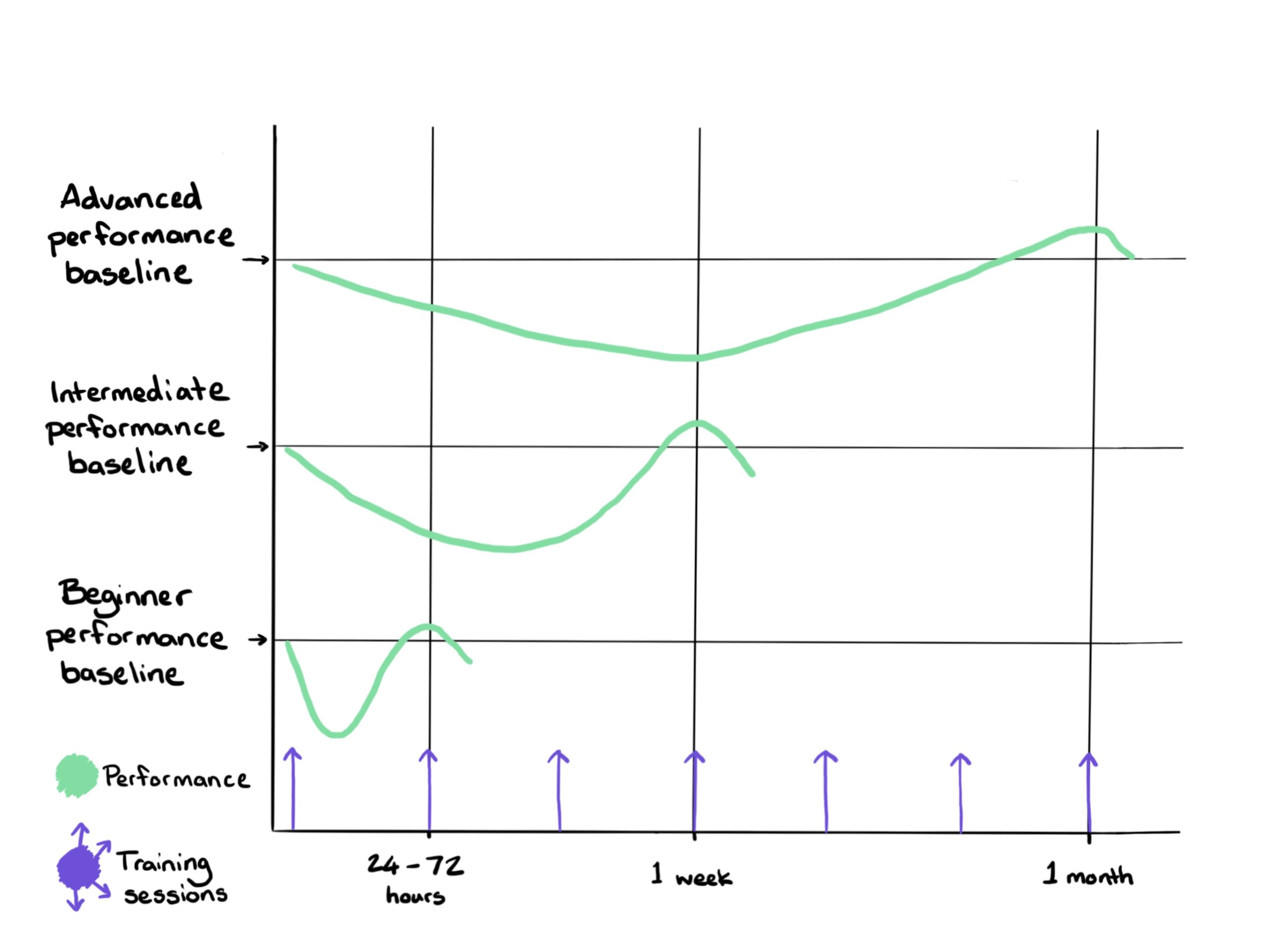
What Is Overtraining?
Interestingly, your capacity to recover quickly is as trainable as your strength and fitness. Unfortunately, workout recovery is something that’s often overlooked, and people regularly overestimate how quickly they can recover from exercise. Your recovery must always be proportionate to your training, otherwise overtraining occurs.
Overtraining happens when you repeatedly work out again before you’ve recovered enough.
What Are The Signs Of Overtraining?
Effects of overtraining include:
- Excessive fatigue
- Inability to recover from exercise
- Compromised athletic performance
- Reduced sleep quality
- Chronic pain
- Mood swings
- Low mood
- Elevated resting heart rate
- Changes in appetite
- Impaired sexual function
It’s important to remember that everyone will experience overtraining differently, with varying symptoms.
Discover the 10 essential habits you need to optimise your health, fitness and wellbeing...
Am I Overtraining?
If we notice that a client isn’t performing as well as expected, and suspect they’re overtrained, we'll make their next training cycle very light - it’ll include the same exercises, but with some combination of less weight, reps, sets, or longer rest periods. A training cycle for a beginner would be a few days, a week for an intermediate athlete, or a month for an advanced athlete. If they don’t appear to have recovered by the end of that cycle, we can be sure they’re overtrained, and would have to come up with a specific recovery protocol for them. Athletes can lose weeks or even months of valuable training time getting back to normal after overtraining. The longer you spend in an overtrained state, the longer you’ll need to recover. If you're concerned that you might be overtraining, speak to an exercise professional, unless you have symptoms which require medical care, in which case speak to a doctor.
How To Recover Faster Post-Exercise
1. Sleep
When we sleep, our bodies produce more anabolic (tissue building) hormones and fewer catabolic (tissue wasting) hormones, which allows us to repair and rebuild muscle, as well as other tissues like bone and skin.
Sleep is also essential for mental recovery. Throughout each day, by-products of our brain use build up in our heads, which are cleared during sleep. If you’ve ever tried to function on little or no sleep, you’ll know that “brain fog” seriously dampens cognitive function.
Action Step:
Ensure that you’re getting roughly 5 or 6 sleep cycles per night. A single sleep cycle is around 90 minutes long, which means you’d sleep for 7.5 to 9 hours.
The quality of your sleep is important too. Avoid stimulants and drugs like sugar, caffeine, and alcohol as they can wreck your sleep quality. Set up a restful environment that’s comfortable, dark, and quiet, and implement a regular sleep schedule or routine where possible.
2. Hydration
Every biochemical process in the body takes place in water and so to facilitate quick and healthy recovery, you’ll want to make sure you’re hydrated. That doesn’t just mean drinking water : any fluid, even watery foods such as cucumber contribute to your daily water intake. That said, water is often the best way to hydrate yourself as other fluid sources can contain extra calories, alcohol, caffeine or chemicals that you may not want to consume.
Action Step:
To calculate your daily water requirement, you could try either of the following formulae:
- 1:1 ratio of millilitres to calories per day for adults
- Bodyweight(kg) x 0.038 = daily water requirement in litres for adults who exercise
3. Calories
Calories equal energy, which you’ll need to replenish your energy stores after working out, and to repair cellular damage from training. For most people it really doesn’t matter too much whether you get more calories from carbs or fat but you need a bit of both. You might notice that you function better on a higher or lower percentage of calories from carbs/fats, or perhaps you simply enjoy a diet containing more of one than the other. Carbs are quickly absorbed and useful if you’re doing regular weightlifting or high intensity exercise. Fats are more slowly absorbed and better suited to people doing more “low and slow” aerobic activity.
You need to consume more calories than you burn off in order to drive progress. This is why it can be hard to lose body fat whilst gaining strength and building muscle tissue - there’s a delicate balance to strike. A daily surplus of roughly 200-400 calories is ideal for most. If your calorie surplus is too high then you’ll gain body fat, so it’d be a good idea to have a professional calculate your caloric and macronutrient requirements if this is a concern for you.
Action Step:
If you just want a rough idea of how many calories you need, use an online calculator like the one on myfitnesspal.com
If you’re more serious about your training, want to make sure you’re getting things right straight away, or have more questions on the subject, speak to a reputable professional who can do the calculations for you and provide more support.
4. Protein
Your body uses protein to build muscle tissue. If you don’t consume enough protein, other bodily tissues (usually muscle elsewhere in the body) will be broken down to repair training damage. Click here to learn more about protein and how you can make sure you're getting enough.
Action Step:
Calculate your protein requirement based on the formulae below:
- 0.8g protein per kg bodyweight daily minimum for sedentary adults
- 2.2g protein per kg bodyweight daily max for adults who exercise
- 3.5g protein per kg bodyweight daily absolute max for elite athletes (not recommended)
5. Essential Fatty Acids
Omegas 3 and 6 are fatty acids that the body can’t synthesise itself from other types of fat: you have to be sure to include them in your diet. Omega 3 is most relevant for recovery (omega 6 can actually be detrimental if you consume too much of it), and can be most easily found in fish.
Action Step:
Consume foods containing omega 3 as part of your normal diet. One generous serving of fish per day should provide all you need. Alternatively, you can find omega 3 in a variety of nuts and seeds, or many people find fish oil supplements helpful.
6. Micronutrients

Vitamins and minerals - or micronutrients - are used in complex ways throughout your body. It’s hard to provide a recommendation on how much to consume, and even harder to measure, but you can trust that a sufficiently varied diet will give you all you need.
Action Step:
Consume 10 shades of vegetables and fruit per day. Different shades, eg dark green kale and light green peas, indicate the presence of different micronutrients in foods.
If you’re not sure your diet is varied enough, or you don’t have access to a wide range of ingredients, multivitamin supplements can help. The micronutrients in them won’t be as bioavailable (easily absorbed) as those in real foods, so I’d recommend investing in a product that uses plant-based rather than synthetic micronutrients.
7. Physical Techniques
The best approach to recovery is a proactive one. Sitting around can make muscle soreness more painful and longer lasting, whilst gentle movement such as stretching, swimming, or yoga stimulates blood flow, helping your body to deliver essential nutrients (eg protein) and mobilise the by-products of exercise (lactic acid) from affected areas. Massage and foam rolling are also excellent for this purpose.
Action Step:
- Maintain an active lifestyle and avoid being sedentary for long periods.
- Try various recovery methods to find out what works for you.
- Read more about muscle soreness here
8. Mental Techniques
Your mental state has the power to speed or slow your recovery, and practising good mental health is an essential part of exercise and wellbeing. You can train your brain to respond more positively to stress, rather than allowing it to affect you negatively.
Action Step:
Practise mindfulness to relax your nervous system, reducing the release of the stress hormone cortisol and increasing the production of growth hormone.
Maintain a level of self awareness to help you avoid and manage stress from other sources like work and relationships. Sometimes you can’t control the stressors in your life, but you can always choose to maintain composure and respond in a cool manner.
9. Complementary Therapies
There are countless therapies available to help rejuvenate your body and mind, each with varying levels of effectiveness and scientific credibility. It’s up to you to experiment and decide what does/doesn’t work for you.
Action Step:
Consider trying one or more of the therapies below:
- Aromatherapy
- Acupuncture/acupressure
- Ice baths, ice packs, heat packs
- Cupping
- Cryotherapy
- Electrostimulation
- Compression garments
Take-Home Message
Considering the fact that adaptations from training occur during recovery, it's always a good idea to plan your rest as well as you plan your training.
This doesn't necessarily mean taking time off exercise, rather working on different movements/skills/muscle groups, and ensuring that you're giving your body all it needs to make the most of your efforts in the gym.
Search Posts
Free Download
Popular Posts
Discover Online PT
Read More Helpful Articles
Subscribe For New Post Updates
Receive new posts, special offers, discounts, plus exclusive content that we only send out via email.
Don't miss out!

